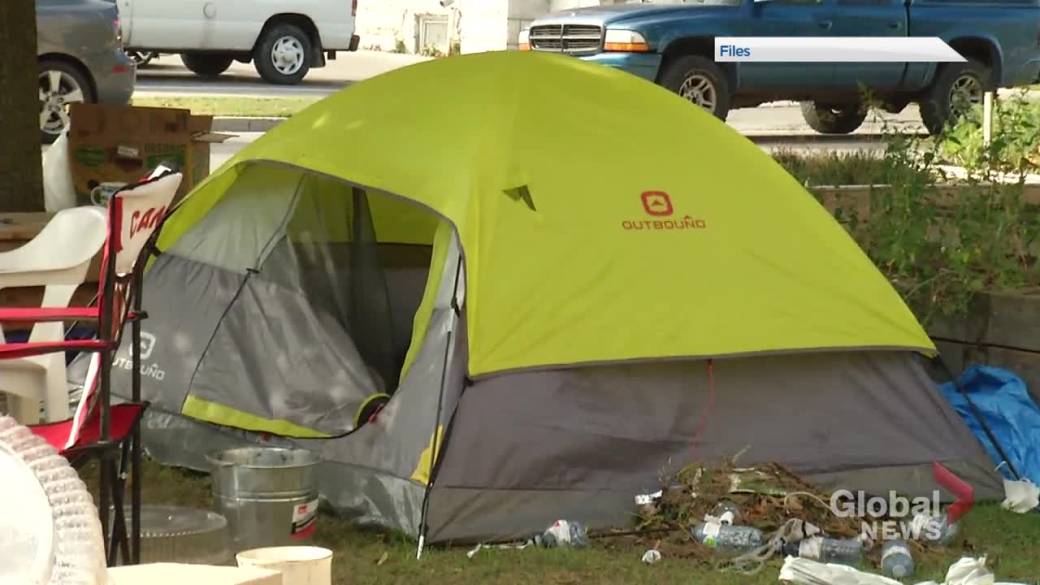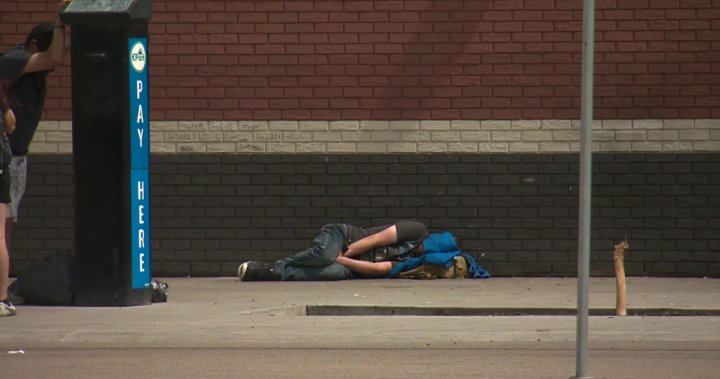Amid an infectious disease outbreak in downtown Edmonton, a prominent local doctor is calling for more to be done to get the homeless into stable shelters.
“Shigella is an infectious disease that we see in third world countries or after earthquakes, disasters or floods,” said Dr. Louis Francescutti, professor of public health at the University of Alberta and emergency physician at the Royal Alexandra Hospital and the Northeast Community Health Centre.
“We have third world medical conditions in the middle of Edmonton in 2022. Completely unacceptable.”
Shigella is an acute infectious disease that is often associated with diarrhea, fever, nausea and stomach cramps. A strain of bacteria causes dysentery.
It spreads when someone comes into contact with feces from an infected person and also by eating food contaminated with the bacteria, according to Alberta Health Services.
Francescutti said Shigella is commonly transmitted from person to person when people don’t have access to good personal hygiene.
“In other words, they can’t shower, they can’t go to the toilet and wash their hands properly afterwards,” he said.
Continue reading:
5 foods that help fight diarrhea — and 5 foods to stay away from
Continue reading
-

5 foods that help fight diarrhea — and 5 foods to stay away from
AHS said a cluster of Shigella cases among inner-city populations was identified as early as August.
To date, the health authority has identified 87 cases – 64 of which required hospitalization. The first case fell ill on August 17. No deaths have been reported so far, according to the AHS.
Francescutti said infected people typically have persistent watery and possibly bloody diarrhea that would keep them at home and around a bathroom.
“What we’re seeing in a population that’s currently homeless is an inability to do these simple things,” he said.
Marliss Taylor, director of public health at Boyle Street Community Services, described the illness as a never-ending form of food poisoning.
“Having no place to go and no support, all of that would make it absolutely awful and I think we see that for some of our community members,” she said.
Continue reading:
Advocate calls for public alert over outbreak of dysentery in Vancouver’s Downtown Eastside
The disease can cause serious illness, leading to hospitalization.
“Some of them end up in intensive care,” Francescutti said.
“Once they have the infection, their gut lining becomes weakened and leaky, and then bacterial products enter their bloodstream — so they go into septic shock.”
The disease can lead to serious symptoms, Francescutti said, like dehydration leading to potassium, sodium and electrolyte imbalances that can impair heart and kidney function.
He said he’s had four patients with dangerously low potassium levels in the past week.
“They could even lose so much blood from the bloody diarrhea that their hemoglobin is compromised. You may develop chest pain and shortness of breath. So the list goes on.”

Francescutti said he had never experienced a situation like this in his more than 30 years as a doctor and that unless the outbreak is brought under control it will get worse as we head into winter.
“It will tie up an enormous amount of health resources at great cost if some basic public health measures could prevent it.”
Taylor has been at Boyle Street for 27 years and said she has never seen an outbreak of Shigella.
“We might have moments of food poisoning or norovirus that can happen,” she said.
“But this ongoing outbreak is very new and very difficult.”
AHS said the majority of cases to date have involved the homeless population, leaving the risk to the general public low, but Francescutti refutes this.
“Anyone can get Shigella,” he said, explaining that it’s as simple as touching a doorknob and then your face.
Francescutti said while most citizens who have a home and a GP can manage the disease, someone on the street is also likely to be struggling with other health conditions, such as weakening the immune system or being mentally ill and are unable to take care of themselves.
“If left unchecked, they could end up in intensive care and die of an infectious disease in 2022 — which is crazy when you stop and think about it.”
Continue reading:
Health advocates want Alberta to spend more on injury and disease prevention
AHS said it has reached out to doctors, inner-city shelters and partners to make them aware of the outbreak and offered advice to get it under control.
The health care provider said he is leading a task force with the city, Alberta Health, Community and Social Services, Edmonton Area Shelters and other partner organizations to share resources and stop the spread.
But Francescutti said the real solution should be for homeless people to get off the streets into affordable and supportive housing.
“We need to be able to give people a place to live a life that’s pretty much like the life you and I have: their own bathroom, their own shower, their own ability to be themselves keep clean and stop the spread of this infection. ”
People sitting outside the Hope Mission homeless shelter in central Edmonton on June 13, 2022.
Tim Pasma, manager of homelessness programs at Hope Mission, said the organization has been aware of the disease for some time and sees it spreading among people living in homeless camps.
Continue reading:
Edmonton saw a 25% increase in warehouse complaints over the past year
His organization has done everything it can to prevent spread at the shelter, Pasma said, explaining the focus is on hygiene practices and increased deep cleaning of the building.
“As we see more people coming in during winter and the number of gathering spaces increasing, we want to make sure we have everything ready to contain the spread once people are closer together,” Pasma said.
AHS reminds people that proper hand hygiene helps prevent the spread of many diseases, including Shigella.
Continue reading:
“Clusters” of diseases being studied at an Edmonton-area school
© 2022 Global News, a division of Corus Entertainment Inc.
#Shigella #outbreak #spreads #among #Edmontons #homeless #population #world #conditions #Edmonton #Globalnews.ca




Leave a Comment